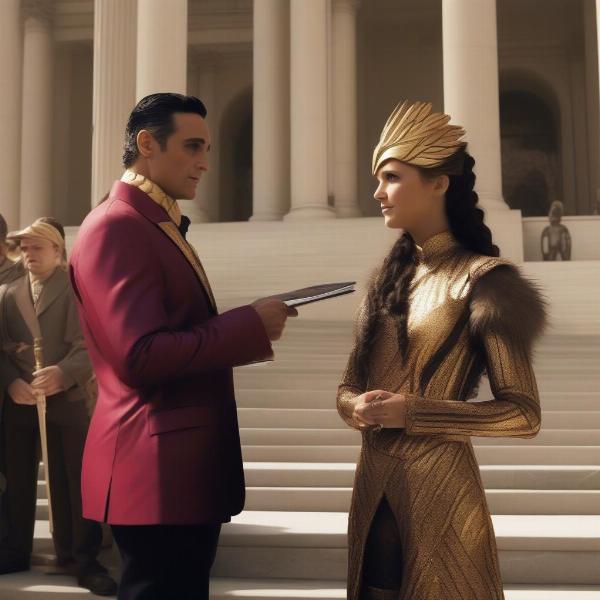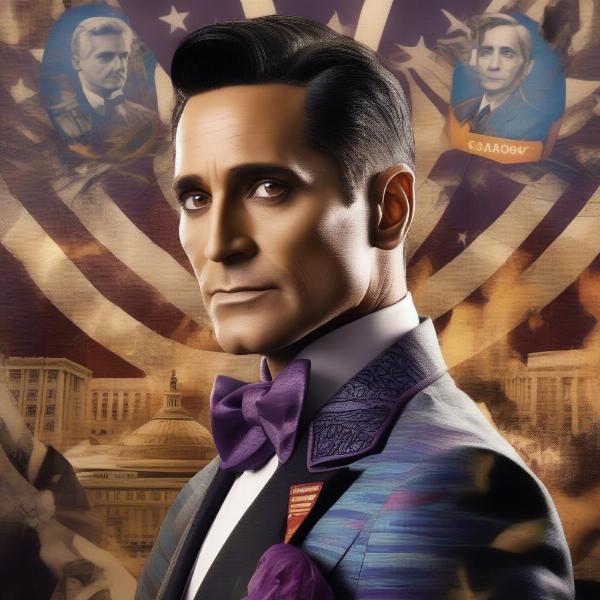Caesar Flickerman, the flamboyant and ever-present Master of Ceremonies of the Hunger Games, is a constant throughout much of the series. He’s the face of the Capitol’s entertainment, interviewing tributes before the Games and providing commentary throughout the brutal competition. But his fate, especially after the rebellion gains traction, is a question many fans ponder. So, what happens to Caesar Flickerman in The Hunger Games? Let’s delve into the details.
Caesar Flickerman: The Face of the Games
Caesar is more than just an interviewer; he’s a symbol of the Capitol’s opulent and superficial culture. His extravagant outfits, vibrant makeup, and theatrical persona embody the Capitol’s obsession with spectacle and its indifference to the suffering of the districts. He’s a master manipulator, expertly extracting emotional responses from tributes and shaping public perception of the Games. But beneath the surface, his role is complex, and his survival depends on navigating the changing political landscape.
The Changing Tides: Caesar’s Role in the Rebellion
As the rebellion gains momentum, the Capitol’s control weakens, and the future of the Games becomes uncertain. Caesar’s position becomes precarious. He’s forced to walk a tightrope, maintaining his public persona while subtly hinting at the growing unrest. This delicate balance is crucial to his survival. He knows that open defiance could mean his demise, but complete compliance could make him a target of the rebels.
Does Caesar Die in The Hunger Games?
The books don’t explicitly state Caesar Flickerman’s fate after the rebellion. This ambiguity has led to much speculation among fans. Some believe he was executed by the new regime for his association with the Capitol, while others think he managed to adapt and survive, perhaps even continuing his broadcasting career in a changed Panem. The lack of a definitive answer allows for interpretation and adds to the complexity of his character.
 Caesar Flickerman Interviewing Katniss Everdeen
Caesar Flickerman Interviewing Katniss Everdeen
The Power of Propaganda: Caesar’s Influence
Caesar’s influence on the Games is undeniable. He shapes the narrative, influences public opinion, and humanizes the tributes, making them more relatable to the Capitol audience. This humanization, while seemingly compassionate, ultimately serves to make the Games more palatable, further obscuring the brutal reality of the competition.
Caesar’s Interviews: A Closer Look
Caesar’s interviews are carefully orchestrated performances. He uses charm, flattery, and emotional manipulation to elicit responses from the tributes, creating compelling storylines that captivate the audience. These interviews are a key part of the Hunger Games spectacle, drawing viewers into the drama and diverting attention from the underlying political tensions.
 Caesar Flickerman and Capitol Propaganda
Caesar Flickerman and Capitol Propaganda
Caesar’s Legacy: More Than Just Entertainment
Regardless of his ultimate fate, Caesar Flickerman’s legacy is complex and multifaceted. He is a symbol of the Capitol’s decadence, a master manipulator, and a skilled entertainer. He is also a survivor, adapting to the changing political landscape to maintain his position. His story highlights the power of propaganda and the role of media in shaping public perception.
The Unspoken Truth: Caesar’s Silence
While Caesar rarely speaks out against the Games directly, his silence is telling. He witnesses the brutality, the manipulation, and the suffering, yet he continues to play his part. This silence raises questions about complicity and the ethical implications of entertainment built on exploitation.
“Caesar’s role is a fascinating study in complicity,” says Dr. Amelia Hawthorne, a leading expert in Panem’s socio-political dynamics. “He’s a cog in the machine, perpetuating the Games through his performance. His silence is as powerful as his words, highlighting the complex moral dilemmas faced by those living under oppressive regimes.”
 Caesar Flickerman and the Hunger Games Arena
Caesar Flickerman and the Hunger Games Arena
The Future of Panem: What Happened After the Rebellion?
The rebellion’s success marked a turning point for Panem. The Games were abolished, and a new government was established. But the scars of the past remained, and the rebuilding process was long and arduous. The future of Panem was uncertain, and the fate of figures like Caesar Flickerman remained shrouded in mystery.
“The ambiguity surrounding Caesar’s fate is intentional,” notes historian Dr. Cassius Crane, author of “The Fall of the Capitol.” “It forces us to confront the complexities of justice and accountability in a post-conflict society. What do you do with those who enabled the oppression, but didn’t directly participate in the violence?”
Conclusion: The Enigma of Caesar Flickerman
What happens to Caesar Flickerman in The Hunger Games remains unanswered in the books. His fate is left to the reader’s interpretation, adding to the complexity and intrigue of his character. Whether he was executed, disappeared, or adapted to the new Panem, Caesar’s impact on the Hunger Games and his role in the Capitol’s propaganda machine cannot be denied. His story serves as a reminder of the power of media and the importance of critical thinking in a world saturated with carefully crafted narratives. What do you think happened to Caesar? Share your thoughts in the comments below.
FAQs about Caesar Flickerman
- Who is Caesar Flickerman in The Hunger Games? Caesar Flickerman is the flamboyant Master of Ceremonies of the Hunger Games. He interviews the tributes and provides commentary throughout the Games.
- What is Caesar Flickerman known for? He is known for his extravagant outfits, colorful makeup, and theatrical persona. He’s a master of manipulation and a symbol of the Capitol’s decadence.
- Does Caesar Flickerman die in The Hunger Games? The books do not explicitly state his fate after the rebellion.
- What is Caesar Flickerman’s role in the rebellion? He walks a fine line, maintaining his public persona while subtly hinting at the growing unrest.
- Why is Caesar Flickerman important to The Hunger Games story? He embodies the Capitol’s obsession with spectacle and highlights the power of propaganda.
- What is Caesar Flickerman’s relationship with the tributes? He uses charm and manipulation to extract emotional responses from the tributes, creating compelling storylines for the audience.
- What does Caesar Flickerman symbolize? He symbolizes the Capitol’s decadence, the power of media, and the complexities of complicity.

